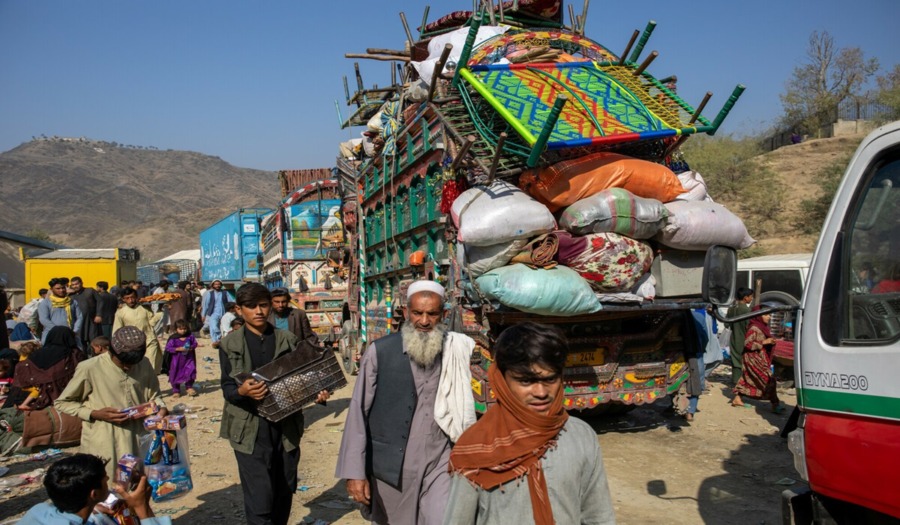Expulsion Order Sparks Surge in Afghan Refugees Returning from Pakistan
- Ingrid Jones
- South Asia
- Trending
- November 2, 2023

The recent expulsion order issued by Pakistan, demanding that all undocumented Afghan refugees leave the country by November 1, has triggered a humanitarian crisis of unprecedented proportions. Aid agencies, including the Norwegian Refugee Council (NRC), the Danish Refugee Council (DRC), and the International Rescue Committee (IRC), have issued urgent warnings and calls for action to address the rapidly rising numbers of Afghans returning to avoid a new crisis.
The impact of this mass exodus is undeniable. Before Pakistan’s announcement, an average of about 300 individuals were returning to Afghanistan daily. However, in the wake of the expulsion order, the daily numbers have skyrocketed, ranging between 9,000 and 10,000 individuals. This sudden influx threatens the well-being of an estimated 1.7 million people, who have no choice but to return to a country still grappling with immense challenges.
The conditions in which these returnees arrive are dire, to say the least. Many have endured grueling journeys spanning several days, exposed to the harsh elements, and often forced to part with their possessions in exchange for transportation. Upon their arrival in Afghanistan, the scenes are chaotic and desperate, reflecting the urgency and lack of choice in this decision.
For these returning Afghans, leaving their temporary refuge in Pakistan was not a matter of choice but a rushed necessity. As one deported Afghani in Nangarhar province lamented, “I am stressed and worried about what to do now. We used to sell tea in Pakistan, but what can we do here? There are no job opportunities in the country, and I don’t have any property or house here.”
The aid agencies express grave concerns about the prospects for survival and reintegration of these returnees into Afghan society, especially with the onset of winter. The existing humanitarian infrastructure and resources are already stretched to their limits.
Neil Turner, NRC’s country director in Afghanistan, emphasized the dire situation, saying, “The recent surge of Afghans returning from Pakistan has overwhelmed our resources, and that is already fragile. People arrive in a terrible condition, having often sold what little they had to pay for the journey. We are deeply concerned about their well-being as well as the strain it places on our already stretched humanitarian efforts.”
Zia Mayar, DRC’s interim country director in Afghanistan, highlighted the desperation of those returning, stating, “Our teams are on the ground witnessing the desperation of those returning to a country already grappling with immense challenges, and with no house or land to go back to. The Afghan people need increased support at a time where funding is sharply decreasing. We call on the international community to act swiftly to address this unfolding crisis.”
Salma Ben Aissa, IRC, said, “The situation in Afghanistan is dire. With an existing population of over six million internally displaced individuals living in dire conditions, the Afghans returning from Pakistan face a bleak future, particularly for those who have been living in Pakistan for decades. We urgently need international support to provide shelter, food, and healthcare for these vulnerable people.”
Regrettably, Afghanistan is still reeling from decades of conflict, recent devastating earthquakes, and a crippling economic crisis. This leaves those who return with few prospects to rebuild their lives, and the need for long-term, sustainable solutions to end the humanitarian crisis is more pressing than ever. Development assistance, which is currently lacking, must be mobilized to provide the Afghan people a chance for a better future.
The situation is further exacerbated by the fact that out of the estimated 4.4 million Afghan refugees living in Pakistan, 1.73 million lack legal documents to stay, making their return home even more challenging. The UNHCR has issued a non-return advisory calling for a ban on forced returns of Afghan nationals, including rejected asylum seekers.
The international community must respond swiftly to address this unfolding crisis. The Afghan people are in desperate need of support, and their suffering should not go unnoticed or unaddressed. With millions inside the country already needing humanitarian assistance, there is an urgent call for increased funding to alleviate their struggles.
As the end of the year approaches, the $3.2 billion appeal to help more than 29 million people across Afghanistan is just 36 percent funded. With so many lives at stake, international donors must provide the assistance required to mitigate this crisis and ensure the well-being and future of those affected by these circumstances.








